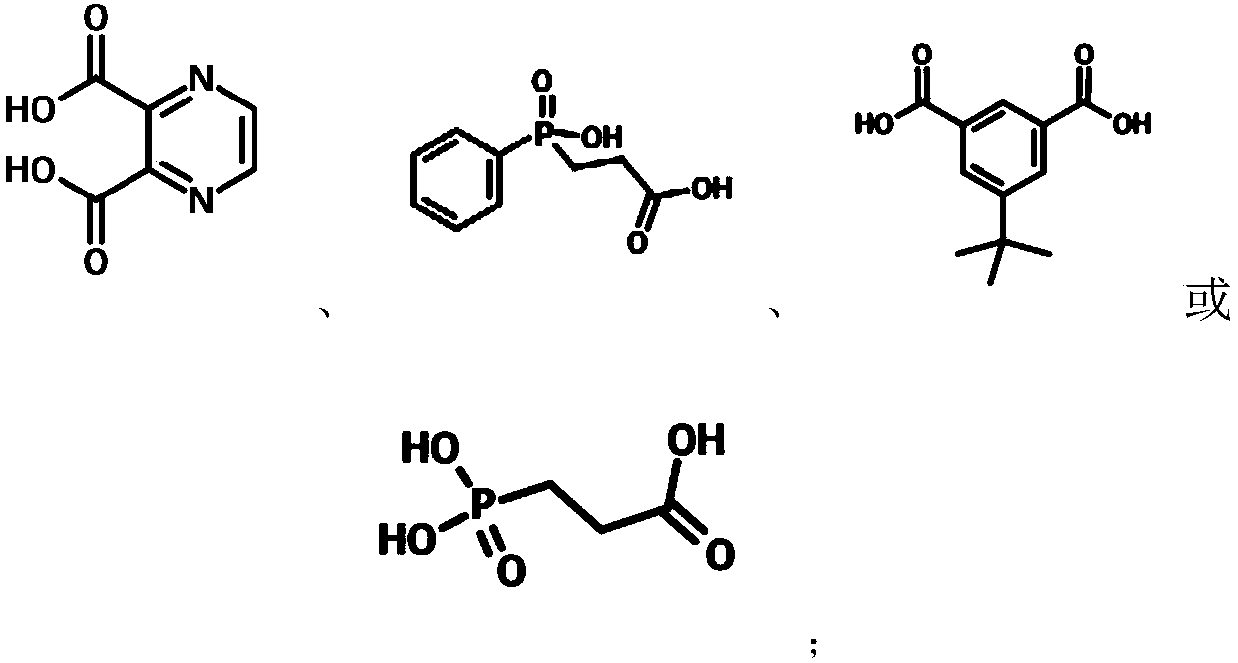Flame-retardant engineering plastics and preparation method thereof
A technology of engineering plastics and hyperbranched polymers, which is applied in the field of flame-retardant engineering plastics and its preparation, and can solve the problems of easy decomposition, popularization and application, easy combustion of engineering plastics, and unfavorable molding processing.
- Summary
- Abstract
- Description
- Claims
- Application Information
AI Technical Summary
Problems solved by technology
Method used
Image
Examples
Embodiment 1
[0046] The preparation method of flame-retardant engineering plastics, the specific steps are as follows:
[0047] (1) Preparation of metal modified hyperbranched polymer;
[0048] (1.1) Use A 2 +B 3 Synthetic method to prepare a hyperbranched polymer with terminal carboxyl group: A 2 Is pyrazine-2,3-dicarboxylic acid; B 3 1,1,1-tris(hydroxymethyl)propane;
[0049] The prepared hyperbranched polymer with end groups containing carboxyl groups contains ester groups in its molecules, the number of carboxyl groups accounts for 25% of the total end groups, the degree of branching is 60%, and the weight average molecular weight is 2000 g / mol;
[0050] (1.2) Dissolve the hyperbranched polymer with carboxyl end groups in chloroform to obtain a concentration of 0.7 mol / L of the hyperbranched polymer solution with carboxyl end groups, and dissolve cobalt acetate in deionized water to obtain a concentration of 0.8 mol / L. L metal ion solution;
[0051] (1.3) Under the conditions of mechanical stir...
Embodiment 2
[0058] The preparation method of flame-retardant engineering plastics, the specific steps are as follows:
[0059] (1) Preparation of metal modified hyperbranched polymer;
[0060] (1.1) Use A 2 +B 3 Synthetic method to prepare a hyperbranched polymer with terminal carboxyl group: A 2 Is: 2-carboxyethylphenylphosphinic acid; B 3 Is: Tris (2-carboxyethyl) isocyanurate;
[0061] The prepared hyperbranched polymer with end groups containing carboxyl groups contains ester groups in its molecules, the number of carboxyl groups accounts for 27% of the total end groups, the degree of branching is 53%, and the weight average molecular weight is 43,000 g / mol;
[0062] (1.2) Dissolve the hyperbranched polymer with carboxyl group at the end group in acetone to obtain a solution of the hyperbranched polymer with carboxyl group at the end group concentration of 0.85mol / L, and dissolve nickel acetate in deionized water to obtain a concentration of 0.95mol / L. L metal ion solution;
[0063] (1.3) Unde...
Embodiment 3
[0070] The preparation method of flame-retardant engineering plastics, the specific steps are as follows:
[0071] (1) Preparation of metal modified hyperbranched polymer;
[0072] (1.1) Use A 2 +B 3 Synthetic method to prepare a hyperbranched polymer with terminal carboxyl group: A 2 As: 5-tert-butyl-1,3-benzenedicarboxylic acid; B 3 As: 2,4,5-trihydroxyphenylbutanone;
[0073] The prepared hyperbranched polymer with end groups containing carboxyl groups contains ester groups in the molecule, the number of carboxyl groups accounts for 25% of the total end groups, the degree of branching is 30%, and the weight average molecular weight is 15000g / mol;
[0074] (1.2) Dissolve the hyperbranched polymer with carboxyl end group in N,N-dimethylformamide to obtain a solution of the hyperbranched polymer with carboxyl end group at a concentration of 0.9 mol / L. Obtain a metal ion solution with a concentration of 1.0 mol / L in ionized water;
[0075] (1.3) Under the conditions of magnetic stirring...
PUM
| Property | Measurement | Unit |
|---|---|---|
| thickness | aaaaa | aaaaa |
| flexural modulus | aaaaa | aaaaa |
| decomposition temperature | aaaaa | aaaaa |
Abstract
Description
Claims
Application Information
 Login to View More
Login to View More - R&D
- Intellectual Property
- Life Sciences
- Materials
- Tech Scout
- Unparalleled Data Quality
- Higher Quality Content
- 60% Fewer Hallucinations
Browse by: Latest US Patents, China's latest patents, Technical Efficacy Thesaurus, Application Domain, Technology Topic, Popular Technical Reports.
© 2025 PatSnap. All rights reserved.Legal|Privacy policy|Modern Slavery Act Transparency Statement|Sitemap|About US| Contact US: help@patsnap.com



